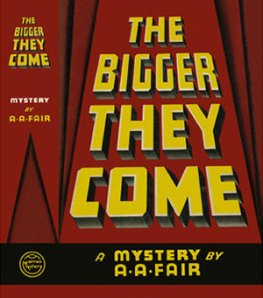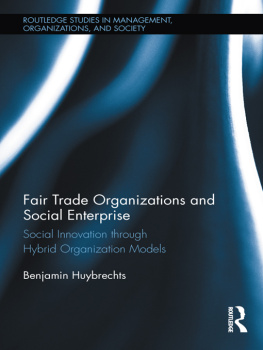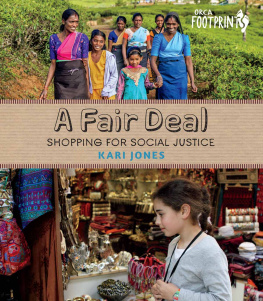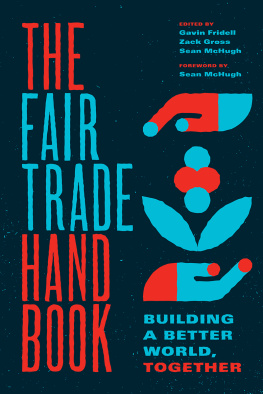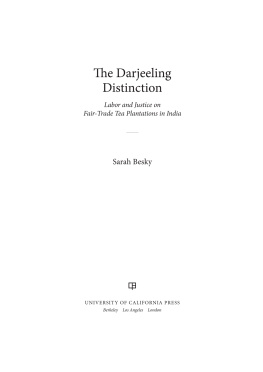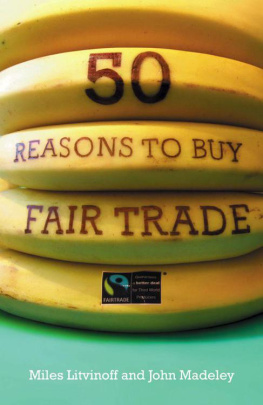Thank you for buying this ebook, published by NYU Press.
Sign up for our e-newsletters to receive information about forthcoming books, special discounts, and more!
Sign Up!
About NYU Press
A publisher of original scholarship since its founding in 1916, New York University Press Produces more than 100 new books each year, with a backlist of 3,000 titles in print. Working across the humanities and social sciences, NYU Press has award-winning lists in sociology, law, cultural and American studies, religion, American history, anthropology, politics, criminology, media and communication, literary studies, and psychology.
Fair Trade and Social Justice
Fair Trade and Social Justice
Global Ethnographies
EDITED BY
Sarah Lyon and Mark Moberg

NEW YORK UNIVERSITY PRESS
New York and London
www.nyupress.org
2010 by New York University
All rights reserved
Library of Congress Cataloging-in-Publication Data
Fair trade and social justice : global ethnographies/
edited by Sarah M. Lyon and Mark Moberg.
p. cm.
Includes bibliographical references and index.
ISBN-13: 9780814796207 (cl : alk. paper)
ISBN-10: 0814796206 (cl : alk. paper)
ISBN-13: 9780814796214 (pb : alk. paper)
ISBN-10: 0814796214 (pb : alk. paper)
[etc.]
1. International trade. 2. Competition, Unfair. 3. Social justice.
I. Lyon, Sarah M. II. Moberg, Mark, 1959
HF1379.F342 2010
382.3dc22 2009053609
New York University Press books are printed on acid-free paper,
and their binding materials are chosen for strength and durability.
We strive to use environmentally responsible suppliers and materials
to the greatest extent possible in publishing our books.
Manufactured in the United States of America
10 9 8 7 6 5 4 3 2 1
Contents
Mark Moberg and Sarah Lyon
Julia Smith
Mark Moberg
Catherine Ziegler
Sarah Besky
Sarah Lyon
Catherine S. Dolan
Patrick C. Wilson
Faidra Papavasiliou
Molly Doane
Kathy MCloskey
Jane Henrici
Acknowledgments
Virtually unheard of a few decades ago, fair trade has suddenly emerged as one of the fastest growing segments of the consumer market, with hundreds of agricultural and manufactured goods now certified as having been produced under socially and environmentally sustainable conditions. Recent years have witnessed annual growth rates of 30 percent or more in the global consumption of such goods, with sales now topping two billion dollars annually. Much that has been written of this rapidly growing phenomenon has taken as its point of departure the language of fair trade advocates in the now-developed world. Fair trade is seen as a means by which solidarity and mutual respect are created between producers and consumers in place of capitalist imperatives of competition and profit maximization. However, for all the value-laden discourse surrounding fair trade advocacy, only in the past few years have anthropologists and other scholars begun to examine critically how this movement actually operates on the ground, among those involved in fair trade networks. This book grew out of a panel organized by Sarah Lyon for the 2007 meetings of the American Anthropological Association. The panel brought together researchers whose ethnographic work spanned a wide range of locales and commodities involved in fair trade networks. The enthusiastic response of audience members encouraged us to assemble this work in a published volume, the first to examine a variety of fairly traded commodities from an anthropological perspective.
From the rich array of chapters contributed by our authors there emerged the central dimensions of fair trade around which the volume is organized: Global Markets and Local Realities, Negotiating Difference and Identity in Fair Trade Markets, and Relationships and Consumption in Fair Trade Markets and Alternative Economies. To all our contributors we owe a debt of gratitude for their responsiveness to our suggestions and to those of the volumes external reviewers. Their receptiveness to these comments helped us transform a disparate collection of essays into a coherent and focused manuscript, one in which all of us learned from and drew upon one anothers work. We also wish to acknowledge the enthusiastic support of our editor, Jennifer Hammer, and the staff of NYU Press, who from the outset have guided this project with the utmost professionalism and alacrity. We truly appreciated Jennifers placement of the manuscript with a series of knowledgeable yet critical external readers who compelled all of us, authors and editors alike, to refine and focus our arguments through the process of revision. The final manuscript was immeasurably strengthened by their suggestions, although we of course bear responsibility for any deficiencies that remain.
Ultimately, as anthropologists and authors, all of us owe our greatest debt to the many individualswhether fair trade producers, activists, or consumerswho assisted us in the research on which this volume is built. The experiences of fair trade producers in particular are often represented to the consumers of their goods through the intermediaries of advertising and advocacy that extol the virtues of fair trade. As will be seen in the following chapters, when producers speak in their own voices, they often have a more nuanced story to tell. To them, and to all who aspire to the new world of social and economic justice promised by fair trade, we dedicate this volume.
1
Whats Fair?
The Paradox of Seeking Justice through Markets
MARK MOBERG AND SARAH LYON
Fair Trade and Neoliberal Globalization: A Brief History
In recent decades, the growth of global markets for agricultural commodities, manufactured goods, and artisanal products has made available to residents of the developed countries an unprecedented array of consumer goods originating in diverse cultures and geographies. This seemingly endless expansion of consumer choice is rooted in the process of neo-liberal globalization, a model of economic development now dominant among the worlds governments, multilateral lending agencies, and trade bodies. Intended to promote global trade through neoliberalism as exercised through institutions such as the International Monetary Fund (IMF), the World Bank, and the World Trade Organization (WTO), globalization has dismantled most state policies regulating the movement of capital and commodities across national borders (Basch et al. 1994; Greider 1997; Brennan 2003). Implemented through regional trade agreements such as the North American Free Trade Agreement (NAFTA) and the Single European Market, neoliberal policies have also facilitated massive levels of transnational investment, most of which originates from financial centers in the developed North. Meanwhile, technological and transport innovations of recent decades, particularly jet air cargo and containerized shipping, have brought the fruits of such investment within the reach of consumers in the developed countries (Harvey 1989: 24off.). The result has been a profusion of once-novel agricultural and manufactured goods on retail shelves, as well as traditionally available items originating in new sites of production: winter fruits and vegetables from Central America, cut flowers from Ecuador and Colombia, and fresh seafood from Asia have become routine items of consumption for North American shoppers (Fischer and Benson 2006; Ziegler 2007). This global sourcing of new products, combined with the ongoing volatility associated with markets for traditional bulk commodities such as coffee, tea, cacao, and bananas, has in turn heightened awareness of global wealth disparities. This awareness is a major impetus for the contemporary fair trade movement.
Next page

